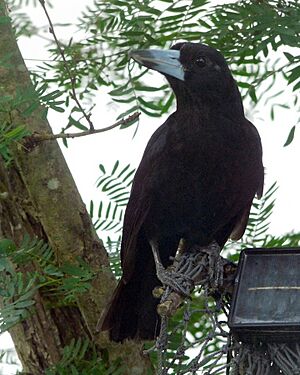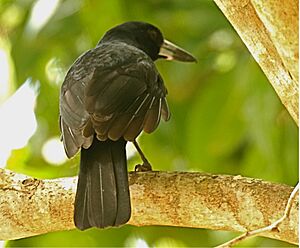Black butcherbird facts for kids
Quick facts for kids Black butcherbird |
|
|---|---|
 |
|
| Conservation status | |
| Scientific classification |
|
| Kingdom: | Animalia |
| Phylum: | Chordata |
| Class: | Aves |
| Order: | Passeriformes |
| Family: | Artamidae |
| Genus: | Melloria Mathews, 1912 |
| Species: |
M. quoyi
|
| Binomial name | |
| Melloria quoyi (Lesson & Garnot, 1827)
|
|
| Script error: The function "autoWithCaption" does not exist. | |
| Synonyms | |
|
Cracticus quoyi |
|
Script error: No such module "Check for conflicting parameters".
The black butcherbird (also known as Melloria quoyi) is a cool bird that belongs to a group called butcherbirds. You can find these birds in places like Australia, Indonesia, and Papua New Guinea. They love living in warm, wet places like tropical forests and mangrove forests near the coast.
About the Black Butcherbird Family
Scientists have studied the genes of the black butcherbird. They found out that it's a close relative of the famous Australian magpie. These two birds share a common ancestor. This ancestor split off from other butcherbirds millions of years ago. Then, the black butcherbird and the Australian magpie became separate species about 3 to 5.8 million years ago.
What Does a Black Butcherbird Look Like?
Adult black butcherbirds are completely black. The only part that isn't black is their beak, which is gray with a black tip.
Young black butcherbirds are usually a reddish-brown color. But sometimes, young birds can be black too. It's also rare, but some brown young birds might stay brown even when they grow up.
Since they are the only butcherbirds that are all black, people sometimes confuse them with crows or currawongs. However, you can tell them apart by their gray, hooked beaks. Crows and currawongs have different beaks.
Black Butcherbird Behavior
In Papua New Guinea, black butcherbirds have been seen laying their eggs in the nests of other birds, like the Hooded monarch. This means the Hooded monarch parents end up raising the butcherbird chicks!
Back in 1903, a bird expert named E. M. Cornwall noticed something interesting. He saw both brown and black types of these birds. The black ones seemed to prefer living deep inside the forest. The brown ones, however, liked to stay closer to the coast, in places with scrub or mangroves.



